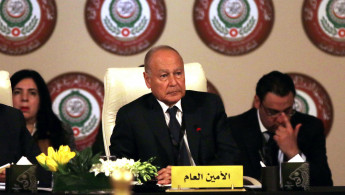Arab League chief urges action on Syria
Arab League chief Ahmed Abul Gheit urged Arab governments on Monday to do more to resolve the conflict in Syria rather than leaving it to other powers.
He was speaking as Arab foreign ministers met to prepare for the Arab League's annual summit, set for Wednesday in Jordan.
"In my view it's not right that Arab governments stay out of the biggest crisis in the region's modern history," Abul Gheit said.
He urged them to "find an effective way of intervening to stop the shedding of blood in Syria and end the war".
The Syrian government was not invited to the summit.
The bloc suspended Syria's membership in late 2011 after anti-regime demonstrations were brutally repressed.
Abul Gheit in February ruled out an early Syrian return to the bloc, saying that this was up to the League's 21 other members.
He said the issue would only be raised when "a political settlement" was in sight for Syria's devastating civil war which has killed 320,000 people.
On Monday, he called on Arab governments to "work in every possible way to play a more active role in major crises", including in Yemen and Libya.
"It is not right that this kind of terrible crisis gets passed over to international and regional powers to manage as they like and control according to their own interests," he said.
"These conflicts all pose a serious threat to Arab security," he said.
The Syrian conflict began when the Baath regime, in power since 1963 and led by President Bashar al-Assad, responded with military force to peaceful protests demanding democratic reforms during the Arab Spring wave of uprisings, triggering an armed rebellion fueled by mass defections from the Syrian army.
According to independent monitors, hundreds of thousands of civilians have been killed in the war, mostly by the regime and its powerful allies, and millions have been displaced both inside and outside of Syria.
The brutal tactics pursued mainly by the regime, which have included the use of chemical weapons, sieges, mass executions and torture against civilians have led to war crimes investigations.





 Follow the Middle East's top stories in English at The New Arab on Google News
Follow the Middle East's top stories in English at The New Arab on Google News
![Israeli forces ordered bombed Gaza's Jabalia, ordering residents to leave [Getty]](/sites/default/files/styles/image_330x185/public/2176418030.jpeg?h=a5f2f23a&itok=_YGZaP1z)

